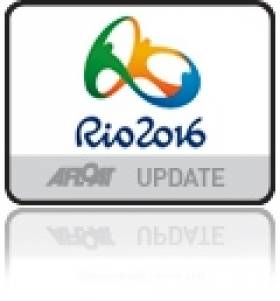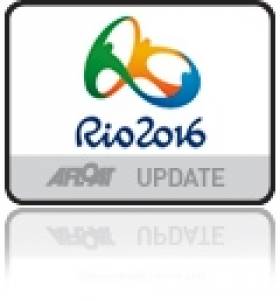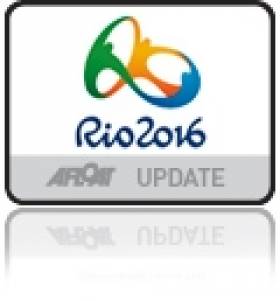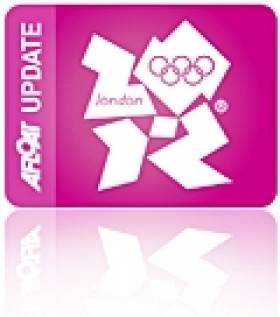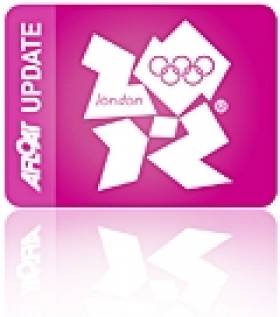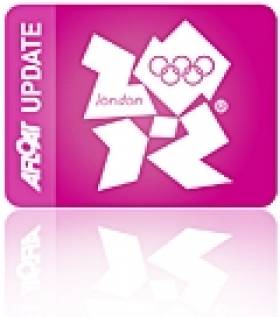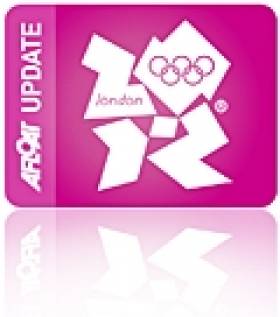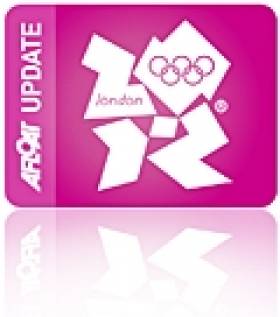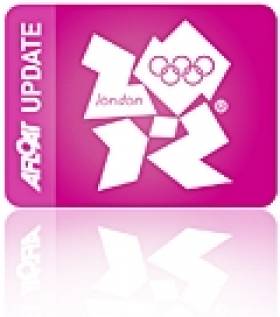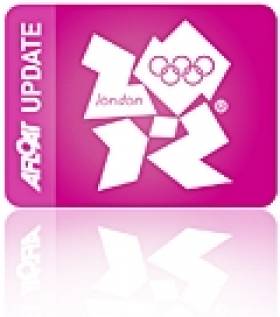Displaying items by tag: Sail for Gold
Ryan Seaton and Matt McGovern have kick-started their Rio 2016 campaign in the most convincing fashion with a Gold medal at the Sail for Gold Regatta in Weymouth this afternoon.
The breakthrough performance is the first international medal for the Belfast lough duo who beat numerous World and European medallists in the process.
This is London 2012 pairing's first major event since competing at the venue a year ago, when Weymouth played host to the Olympic regatta.
Going into today's medal races, the pairing had a six point lead but could have been overtaken by any of the top 10 as three double point races were scheduled. In the end, they sealed victory in style extending their lead as Afloat.ie reported earlier posting a third and a second respectively in the two medal races.
Annalise Wins Sail for Gold Bronze, Irish 49er Extends Lead
#sailforgold – As Ireland's Annalise Murphy collects Bronze in the Laser Radial medal race this afternoon the Irish 49er pairing of Ryan Seaton and Matt McGovern have increased their lead to 10 points over GBR's John Pink and Simon Wheeler with one more race to go in Sail for Gold Regatta in Weymouth.
Murphy adds this third successive medal in the Eurosaf circuit to two Gold medals earned in Holland and Italy in the past month.
The Chinese had already created enough of a points lead to guarantee gold and silver and the odds were in Ireland's favour as four of the five sailors vying for that final podium spot were Irish. Having been given the opportunity to sail in the Women's Radial event at this regatta, some of the world's top youth sailors including Irish U18s Finn Lynch, Fionn Lyden and Seafra Guilfoyle competed. The young Irish trio and Annalise battled it out against the UK's Chloe Martin for the coveted medal in the final race with Annalise ultimately winning and claiming the bronze followed closely by Finn Lynch in second (4th overall) and Fionn Lyden in third (5th overall).
Six Irish sailing teams were racing for medals at Sail for Gold regatta today.
More 49er details as we have it from Weymouth.
Irish 49er Pairing in First Place at Sail for Gold Regatta
#sailforgold – London 2012 49er Irish pairing Ryan Seaton and Matt McGovern have made a great return to the Olympic circuit this week at Sail for Gold Regatta in Weymouth. The Irish 49er team are beating some heavyweight competitors and holding first place by a margin of six points.
In a complete change of conditions in Weymouth Bay there was an average of 20–knots blowing across Portland Harbour largely suiting the Irish fleet on the Dorset coast.
A strong performance from Annalise Murphy moves her into the top five overall with two more fleet races to go but it was the stand out performance of China's Lijia Xu that has impressed many at the former Olympic venue. The Olympic Gold medallist now has a ten point margin over countrywoman Dongshuang Zhang.
In the best day so far for 49erfx campaigners Tiffany Brien and Saskia Tidey they secured top 5 results in today's stronger conditions. They move up two places to sixth overall.
Laser sailor James Espey remains in the middle of the Laser fleet following four races.
Irish youth laser radial sailors Séafra Guilfoyle, Finn Lynch, Fionn Leyden and Cian Byrne are still holding on to their top ten spots.
#genuine prospects – Ireland has won Gold in the Star class and Bronze in the Radial class at the most important pre-Olympic event of the season.
While the boycott reduced Olympics of 1980 may have given hope to the Irish Olympic Sailing team, it is perhaps fair to say that the performances of the class of 2012 are closer to the positive end of the hope-expectation scale. With superb timing, in the last major confrontation of Olympic contenders, the Irish medal race sailors put in tremendous final race performances to take away a first, a third and a seventh from the Skandia Sail for Gold Regatta last week.
With only a few weeks to go to the ultimate competition in this quadrennial, Ireland is set to emulate and perhaps exceed the 1980 result. If we do, it could lessen the burden carried for so long by Wilkins and Wilkinson in the same way that Michael Carruth's gold in Barcelona eventually relieved the nation's unreasonable reliance on Ronnie Delaney.
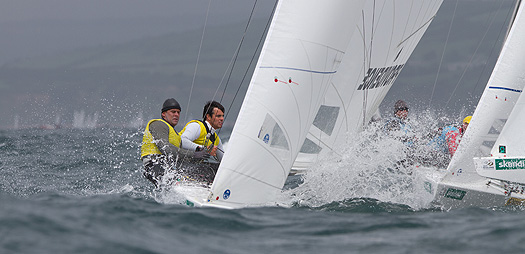
Peter O'Leary and David Burrows on the way to overall victory in the Star class. Photo: Brian Carlin
In the Star Class, Peter O'Leary and David Burrows have been mixing it with the world's best for a couple of years now and in getting the better of current World champions, Brazilians Robert Scheidt and Bruno Prada and the British Olympic Champions, Iain Percy and Andrew Simpson, the Cork/Dublin combo have laid down a very clear message that the destiny of this year's top reward is no longer the two horse race that many punters have been predicting. With consistency across a variety of conditions, the Irish Star team are no longer outsiders for a medal, but have clearly signalled their intention to, once again, ascend the Weymouth podium come August 5th. However, this Star Class is deep with talent and anyone of ten teams could realistically medal. Canada, Switzerland, Poland, France, Denmark and Greece all harbour aspirations to medal in the Star and our heroes will need to double check equipment on a daily basis to ensure they are not denied by equipment failure, particularly with the additional restrictions on coach support during the Games itself.
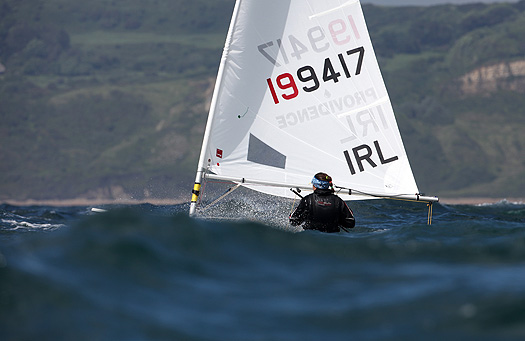
Annalise is recognised as the world leader in heavy airs. Photo: Richard Langdon
Annalise Murphy's welcome return to form, following a Radial worlds dogged by inconsistency and a poor showing (by her standards) at a reduced quality Delta Lloyd regatta, augurs well should Weymouth enjoy decent breeze. Recognised internationally as the class's best heavy weather sailor by some distance, it was encouraging to see that she wasn't completely off the pace in the lighter winds on the regatta's first day. Annalise has set out her schedule for the remaining period prior to the Games – more work on light air sailing work should be a part of the work plan.
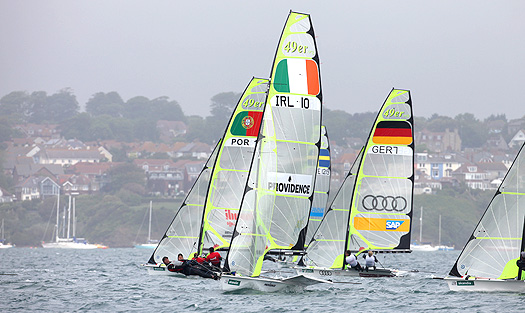
Ryan Searton and Matt McGovern produced three race wins at Sail for Gold last week. Photo: Richard Langdon
Team officials must be delighted, not only with the Star and Radial performances, but also by the 49er team of Ryan Seaton and Matt McGovern. 10th in the 2011 World Championship in Perth must have seemed to be a distant memory with a poor start to 2012.
Less than stellar results in the early season World Cup events culminated in failing to make gold fleet at the 2012 Worlds in Croatia in May last month. However, the Northern Ireland duo bounced back in fine style to record their best result to date. Barely hanging on to the medal race spot in the final gold fleet race, the boys then finished 5th in the medal race, leap frogging three competitors to finish in 7th overall. With three British sailors ahead of them, this conceivably puts them top five in the Olympic fleet. However, form suggests the gold medal battle will be between Spaniards, Iker Martinez and Xabier Fernandez, currently away on Volvo duty, and Australian World Champions Nathan Outteridge and Iain Jensen, with the battle for the minor medal between any number of countries - France, Britain, Finland and Denmark are among those – making the Irish team outsiders. But outsiders with a great boost to their confidence, and this young team, should they continue, will have made a huge claim for enhanced support for the next quadrennial.
So, Irish sailing embarks on the voyage to London 2012 with a reasonable expectation for a positive outcome. But for it to be similar to the Sail for Gold result will not only demand that all our sailors are on their best form, but also that there is consistently strong breeze for the duration. A tall order perhaps? Gaoth láidir, le do thoil!
#sailforgold – Three Irish crews are in the Medal Races of tomorrow's washed out Skandia Sail for Gold Regatta after racing was scrubbed again today because of high winds.
Annalise Murphy in the Laser Radial, Peter O'Leary and David Burrows in the Star and Ryan Seaton & Matt McGovern in the 49er earn medal race starts by virtue of their top ten placings overall. The most likely medal prospect is O'Leary and Burrows who currently lie in the bronze medal position but tomorrow's racing will be worth double points so everything is still to play for.
Ger Owens and Scott Flanigan in the 470 class finish the regatta in 1st place in the Silver Fleet while James Espey finished 4th in the Laser Silver Fleet. Paralympians John Twomey, Ian Costello and Anthony Hegarty in the Sonar class finish 12th overall.
#sailforgold–Annalise Murphy believes she is on track for a top ten finish in her debut Olympics following a fine week at the Skandia Sail for Gold Regatta writes our special correspondent Paul Smith.
The Irish Laser Radial sailor picked up a win and a third place from her two races on day four in Weymouth, as the series entered the gold fleet stage.
Murphy, of Dublin, is now ranked fifth overall, with China's Lijia Xu in first and Britain's Alison Young second. Sari Mutala, of Finland, is third.
The National Yacht Club's Murphy is pleased with how her week has gone so far as she steps up her preparations for London 2012, and she is keen to illustrate her credentials.
"I've had a pretty consistent week, I had one bad race on Wednesday which is probably going to affect me overall in the end but I'm pretty happy," said the 22-year-old, who picked up a further first place on day three.
"I have had much more consistent results than usual so it is good.
"I came here and wanted to be in the top ten to get some medal experience, because every medal race here is important as it is like a step towards the Olympics.
"This will be my first Olympics so I am just going to try and get a good experience. I want to finish in the top ten and hopefully that will give me a good stepping stone towards 2016 but I don't know, anything can happen."
Providence Resources is the sponsor of the Irish Olympic Sailors
Investment specialist Skandia is the principal sponsor of the British sailing team
O'Leary and Burrows Take the Lead in Sail for Gold
#sailforgold – After a most consistent display Irish Olympic pairing Peter O'Leary and David Burrows have shot in to the lead of the Star keelboat class in day two of the Skandia Sail for Gold Regatta in Weymouth today.
The great British weather produced its most horrible best on day two but O'Leary and Burrows brightened things up on the water moving up from fifth to first overall.
The Star class share the most distant course on the Weymouth and Portland sailing waters with the Finn, and they too had three races scheduled, and sailed them. It was the Irish team, – perhaps enjoying the weather more than some of their competitors – that had the best day. O'Leary and Burrows scored a first, second and fourth to hold a two point lead from the World Champions, Robert Scheidt and Bruno Prada.
Last night on the team facebook page a happy O'Leary declared ; '4, 2 & 1. Plenty of pace! 2 races tomorrow in plenty of breeze'
Robert Scheidt was one of those not enjoying the weather so much. "We are really happy with those results but also quite tired with it being a rough day and doing three races. Six- seven hours on the water so I am very much looking forward to a shower!" Another man having a tough day was the 1988 Star Gold Medallist, Mike McIntyre, whose return to the fleet ended badly – he was on port tack on the first beat of the second race when John Gimson (crewed by Dun Laoghaire's Anthony Shanks) tried to duck behind him. The manoeuvre went badly wrong and Gimson crashed into the gold medallist – fortunately McIntyre had borrowed the boat from Gimson!
Ryan Seaton and Matt McGovern continued where they left off yesterday and had their second race win in the 49er class today. They placed 12th in their other two races and now lie 12th overall.
In the Laser Radial, Annalise Murphy also had a solid day on the water in the Laser Radial. She sailed two races placing third and fourth respectively in the 70 boat fleet. She goes into the third day of racing tomorrow 11th overall.

The Star class scoreboard showing Ireland leading tonight in Weymouth
The newest of the team, Ger Owens and Scott Flanigan had a consistent day in the 470 fleet. The youngest of the Irish sailors, Scott Flanigan who is only 19, and his helm Ger placed 7th in both of their races leaving them 23rd overall.
Laser sailor James Espey from Bangor finished 28th and 32nd in his two races. He lies 26th overall in the 95 boat fleet.
And in the Paralympic Sonar class, John Twomey, Ian Costelloe and Anthony Hegarty all from Cork had a 10th and 13th today.
#sailforgold –Ireland is off to a strong start despite the fickle conditions at today's Sail for Gold regatta in Weymouth. By early afternoon on the first day of the regatta all fleets had returned to shore as the wind had disappeared.
Skandia Sail for Gold 2012 kicked off today, featuring almost all of the medal contenders for the upcoming Olympic Games. Over seven hundred athletes from 59 nations poured out onto Portland Harbour and Weymouth Bay, the cream of world sailing ready to put a marker down for the coming Olympiad. But conditions were tough, the forecast was for a transitional day, with a new wind arriving and strengthening throughout the rest of the week. So while Portland Harbour and Weymouth Bay delivered racing, it did so in fits and starts.
Most of the Irish sailors had a long lunch break waiting for conditions to improve and eventually at around 4pm the fleets all launched again in very light conditions.
The day belonged to Ryan Seaton & Matt McGovern, the Belfast Lough duo in the 49er skiff who won the third race very late in the evening having finished 8th and 11th in the previous two races.
Peter O'Leary and David Burrows in the Star class finished 5th in their only race of the day just behind event favourites Robert Scheidt and Bruno Prada (Brazil) and ahead of Iain Percy and Andrew Simpson (Great Britain).
In the 70 strong Laser radial fleet Annalise Murphy from the National Yacht Club in Dun Laoghaire scored 16th & 8th in her two races of the day in 5 knots of wind.
Ireland's most recent Olympic qualifier James Espey in the Laser class had a great start to the regatta scoring eightth in his only race of the day.
Fresh from winning the Delta Lloyd regatta last weekend Ger Owens who will be sailing in his third Olympics in July with Scott Flanigan scored a 19th and 15th in the 470 class.
In the Paralympic Sonar class John Twomey with Ian Costello and Anthony Hegarty finished 10th in their only race of the day.
The 470 race course got the best of the deal, with two races for everyone and a relatively early finish. In the Men's competition, some familiar names popped out in front. Early race winners were British Olympic representatives Luke Patience and Stuart Bithell, along with the all-conquering Aussie duo of Mat Belcher and Malcolm Page, winners of the last three world championships. Belcher and Page won their second race as well, and lead overall at the end of the first day. But it was also a return to the water and an immediate return to form for Britain's double World Champions, Nic Asher and Elliot Willis who scored a second and a third to hold second overall.
Asher and Willis have been kept out of sailing through illness since a below-par World Championships in Perth last year, and this was their first regatta in 2012. In the meantime, rivals Patience and Bithell got the British Olympic slot for the Games – a bitter disappointment to double world champions that have yet to go to the Olympics. Asher commented, "I would like to carry on for Rio but we will make that decision after Skandia Sail for Gold with Sparky (Stephen Park; Skandia Team GBR Olympic Manager). I see other options are stepping into the Skiff or 49er. But it is fantastic to be back and we have some unfinished business here."
The Women's 470 fleet got underway in the afternoon and also completed two races – winners were the new British World Champions and Olympic representatives, Hannah Mills and Saskia Clark. They posted a first and a fourth to lead from Elise Rechichi and Belinda Stowell from Australia. This is a rivalry that will go all the way to the Games.
The story out on the Finn and Star race course – the furthest from the Weymouth and Portland National Sailing Academy – was more typical of the day. They went out in the morning, were sent back to the beach for lunch without any action, were then hauled back out on the water again in the afternoon to finally get a race in. After all that, it was Michael Hestbaek who took the win in the Stars with four-time medallist (two gold and two silver), Robert Scheidt in fourth.
The USA's Caleb Paine won the Finns, with another four-time medallist (three gold, one silver), Ben Ainslie in fifth. Paine commented, "It feels great to have won today obviously not being selected to represent [the USA] in the Olympics, so to beat the other guys who will be there feels great." But for Ainslie it wasn't so much about the results, "My focus for the week is learning, especially the equipment in the boat; the results aren't important this week it is just about getting the preparation right and learning as much about the venue as possible."
The Paralympic course was one of those that raced in both the morning and the afternoon – starting with one race each for the Sonar and the Skud in the morning. The Sonar's were won by Udo Hessels and Mischa Rossen of the Netherlands from Sven Reiger and Edmund Rath of Austria. In the SKUD 18, Qingdao bronze medallists, John Scott McRoberts and Stacie Louttit from Canada took the honours from Australia's Qingdao silver medallists Daniel Fitzgibbon and Liesl Tesch.
John Scott McRoberts commented, "It was great to be first today and we are looking forward to the rest of the week and the windy conditions which we prefer; particularly as we already had lots of practice at the Delta Lloyd regatta in light air." The 2.4mR fleet got out on the Paralympic course in the afternoon, and managed two races in the light conditions. Some very familiar faces were out the front, with both the Netherlands Thierry Schmitter and Megan Pascoe of Team GBR scoring a second and a third to tie for the lead overall, ahead of France's gold and silver medallist, Damien Seguin in third.
Getting the toughest deal were the men on the Laser course, it was very late when they finally got going, pushing on towards seven o'clock. Unsurprisingly, they only got one race in, and it was won by Simon Grotelueschen, beating countryman Philipp Buhl. The Women in the Laser Radial did better, with two races completed by a reasonable hour. It was Dongshuang Zhang of China that took a first and second place to lead overall from Canada's Isabella Bertold and Spain's Fatima Reyes.
It was also a very long day out on the Women's Match Racing course, they started at 10:00 and finished their eleventh flight at 20:20 – almost ten hours later. The only unbeaten teams at the end of the day were Australia's Olivia Price who won six from six and Silja Lehtinen with four from four. And with Russia's Ekaterina Skudina only losing one from six, these three currently top the standings, but there is a long way to go in this competition.
The 49ers took all day to get through it, but they finished three races for both fleets. At the top at the end of the day was Britain's Dave Evans and Ed Powys with two wins and a third. It gives them a solid jump from Austria's second-placed Nico Luca Marc Delle Karth and Nikolaus Leopold Resch. Evans commented, "We like the breeze so we are looking forward to the rest of week. Today was a condition we are ok in, but we don't really do that well in; so getting a good result was great for us."
The RS:X Women got two races in today, and it was Poland's Zofia Noceti-Klepacka that had the best of the day, with a first and a second, edging Britain's Bryony Shaw who had a solid couple of thirds, and Spain's Marina Alabau with a second and an eighth. It wasn't a surprise to Bryony Shaw, who commented afterwards, "We had a couple of light wind specialists up there in the first race and then the two girls who I see as my main rivals from Poland and Spain were there in the second race, really showing their experience when everyone was tired and a bit worn out after the first race, so it was a good little battle with those two."
Zofia Noceti-Klepacka reckons she will be stronger in the windier conditions forecast for the end of the week though – which may or may not worry Shaw. "I prefer it when the conditions are windier so I am looking forward to the rest of the week; the forecast looks great so it will be more fun," said Noceti-Klepacka.
The Men's RS:X got one race done in the morning and another in the afternoon. The day belonged to 2012 World Champion, Julien Bontemps of France, with a first and a third. It was just a one point better performance than Toni Wilhelm of Germany who scored a first and a fourth.
#sailforgold – Tim Hall believes this year's Skandia Sail for Gold Regatta will be the mostly keenly contested yet with the Olympic Games just under two months away and all five Irish Olympic boats in competition. Ireland is also represented in the race management of the event with Olympic race officer Jack Roy from Dun Laoghaire also on the water in Weymouth this week.
The forecast indicates a moderatly windy week with at least 15 knots of breeze throughout the week.
The event director for the Royal Yachting Association spoke as the 2012 event got underway in Weymouth and Portland - which will host the sailing competition at this year's Olympics.
All of Team GB's sailing squad for the Olympics and Paralympics are competing at Sail for Gold, which is also an ISAF World Cup event. Around 750 sailors are taking part in the regatta with all 10 Olympic and all three Paralympic classes being competed in.
"Skandia Sail for Gold is our largest Olympic multi-class regatta," explained Hall. "We have just over 500 boats and that equates to close to 750 sailors from 55 nations all competing for medals at this event. "It is the last major regatta at this, the Olympic venue, so tensions are certainly high and sailors are looking to stamp their authority in preparation for the Olympics.
"The competition is going to be an exceptionally high (standard), probably the highest we have ever seen.
"The sailors are at the top of their game right now, all prepared and focused on the Olympics.
"It is their last opportunity to train at this venue, so tensions are going to be running very high."
Annalise Wins Bronze Medal in Weymouth
Expectations were high and Annalise Murphy delivered in style in Weymouth this afternoon. The 21 year old National Yacht Club sailor has taken bronze at the Sail for Gold Regatta.
The medal did not come without extra drama. The Dun Laoghaire single-hander was in third position in this morning's medal race but collided with Belgian competitor Eva Van Icker and was forced to take a 360 degree penatly turn.
Annalise still managed to finish sixth and third overall, four points ahead of Britain's Charlotte Dobson.
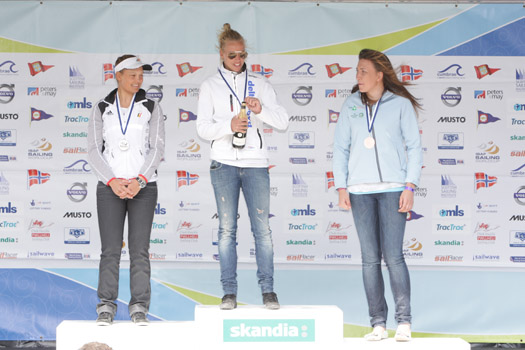
Ireland's Annalise Murphy (right) on the podium in Weymouth today with Gold Medalist Marit Bowmeester from Holland and Silver MedalistEvi Van Acker. Photo: On Edition.



























